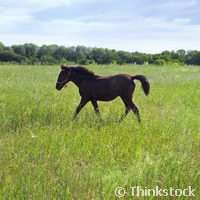Credit: Thinkstock
Equestrianism is an extremely popular and healthy activity for people of all ages. It is a diverse and family-friendly sport and many of us enjoy riding horses. But whether we choose to ride off-road, on fields and bridleways or elsewhere, there are always safety issues that need to be taken into account.
EQUISAFE is a new EU-funded project, launched last November, which aims to help combat the high number of equestrian incidents, including those that go unrecorded. It will run for two years and aims to develop an electronic system that increases overall safety in horse riding and equestrian activities.
Based on wireless sensing, the aim is to develop a novel system for monitoring risks related to horse activities, horse health and behaviour and is intended to be used both by expert and non-experts.
EU-wide data highlights the need for improved safety in this sector. According to the European Association for Injury Prevention and Safety Promotion, equestrian activities in 2009 (the last year for which figures are available) accounted for no less than 15 per cent of all fatal sports injuries in the EU27. Most were due to bolting and nervous and runaway horses. Head injuries made up 13 per cent of all horseback riding accidents with the vast majority of injuries suffered in the 25 to 59-year-old age group.
Funded from the EU's 7th Framework Programme, EQUISAFE consists of several features, including real-time location tracking of horses; online health monitoring with automatic alarms and horse movement and behaviour recognition.
Another feature is automatic detection, via GPS receivers fitted to the horse harness, of abnormal and undesirable behaviour in the stable and when the horse is being handled and ridden. All data is collected and analysed and can trigger an alarm when abnormal behaviour is detected.
EQUISAFE also encompass rider monitoring, including detection sensors that can raise an alarm to a nearby instructor and headquarters if, for example, a rider feels in distress. The system will automatically inform an instructor if a horse separates from a group or becomes nervous.
Christopher Spiteri, of Malta-based Ateknea Solutions, which will coordinate the project, points out that horseback riding attractions are available in over 30 countries across Europe. They have a 'considerable' economic impact on tourist attractions and are becoming ever more popular.
He adds, 'Horseback activities address the needs of riders with different levels of riding proficiency, from beginner to advanced. However, currently there are no safety measures available for such activities. Present-day equestrian activities do not provide the horse rider with horse health conditions and this may adversely compromise the safety of the activity.'
In recent years, a number of celebrities have suffered severe injuries or have even died as a result of horse-riding accidents. Actor, Christopher Reeve, better known as 'Superman', was paralysed in 1995 from the neck down following a fall from his horse while riding, and Cole Porter, the American composer and songwriter, was left in chronic pain and largely crippled after a horse-riding accident in 1937 in which his legs were crushed.
Irrespective of status, EQUISAFE seeks to ensure that every horse - and rider - is as safe as possible.
More information: For more information, please visit EQUISAFE at www.equisafe-project.com
Provided by CORDIS























